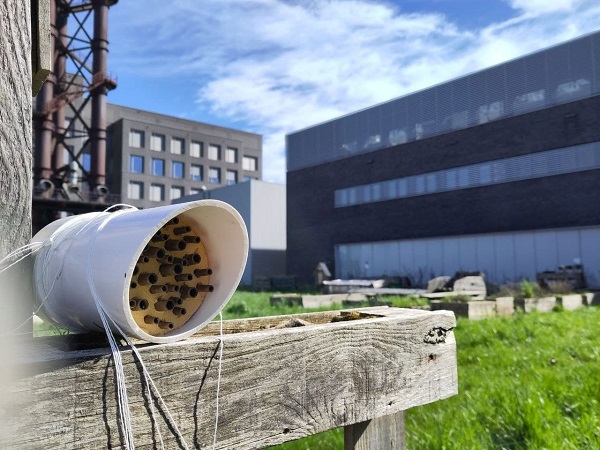 Nesting box for pollinators in Esch-Belval;
Credit: Aline Ouvrard
Nesting box for pollinators in Esch-Belval;
Credit: Aline Ouvrard
CELL - the Centre for Ecological Learning Luxembourg has announced the launch of a new participatory research programme centred around pollinating insects.
CELL is carrying out this three-year programme in partnership with the National Museum of Natural History (MNHN) and 20 community gardens across Luxembourg.
Coordinated through CELL's Polynatur project, the programme aims to increase the available knowledge on the different species of pollinating insects present in Luxembourg and their ecosystems. The second aim is to raise public awareness of the importance of preserving pollinating insects and the value of paying attention to them.
At the end of March 2023, MNHN researchers Alexander Weigand, Paul Braun and Tania Walish met with representatives of the community gardens participating in the project to establish the protocol to be followed, inspired by a method used by Canadian scientists.
The 20 community gardens have started to install insect nesting boxes equipped with tubes, which will allow different species of pollinators present in Luxembourg to lay their eggs, so that they can be identified later through DNA analysis.
First, gardeners and visitors will take photographs of the wild flowers and insects present in the gardens and send them to the researchers via the "iNaturalist" platform. Then, at the end of 2023, the tubes will be collected and sent to a specialised laboratory in Canada, which will identify the exact pollinator species present in each collection area across the country. All nesting boxes will be installed in the participating gardens by 15 April 2023.
CELL has described the significance of this research project as considerable, given that 85% of pollination is carried out mainly by insects, many of which are now threatened with extinction. Aline Ouvrard, coordinator of the CELL Polynatur project, elaborated: "In Germany, the insect biomass has decreased by 75% since 1989! In ten years, a third of insect species have disappeared from forests and meadows, mainly due to the use of pesticides, a significant loss of natural habitats and available food, diseases and invasive alien species, and climate change."
"Insects play a major role in biodiversity: they decompose, shape the soil, control pests, distribute seeds and feed wildlife... and pollinate!" she continued. "It is estimated that the ecosystem services provided by insects are worth €150 billion worldwide and €14.2 billion in the EU."
Each year, CELL coordinates a participatory research programme with community gardens and researchers. In previous years, the themes included irrigation and crop densification.








